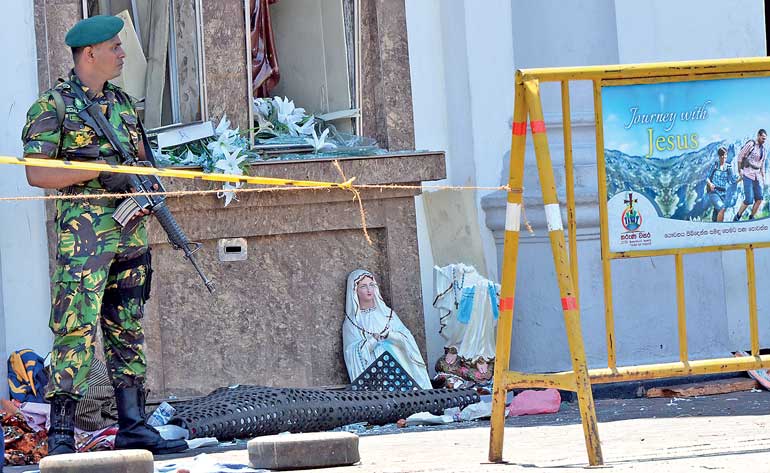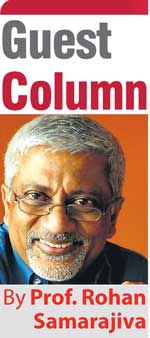Sunday Feb 22, 2026
Sunday Feb 22, 2026
Tuesday, 17 January 2023 00:38 - - {{hitsCtrl.values.hits}}

Those who are sitting on their hands with regard to the investigation of the masterminds and facilitators of the Easter bombing should be warned. The day that they too will be held accountable may not be far – Pic by Shehan Gunasekara

Hejaaz Hizbullah’s tweet on the Supreme Court’s decision on the 12 complaints alleging violation of fundamental rights by Government action/inaction regarding the Easter bombings makes two points:
Grateful to the SC for its judgement in the #EasterSundayAttacks FR. The Court has dealt with the issue with tenacity and expressed itself with discipline.
However, there is more to this incident. I pray for the truth to be known & the unmasking of the real mastermind.
Any person who believes that a fundamental right or language right provided for in the Constitution has been infringed or is about to be infringed by executive or administrative action, may petition the Supreme Court under Article 126 of the Constitution for relief or redress.
This exceptional remedy is solely about executive or administrative action and is not a substitute for criminal prosecution which is what would be needed to assign responsibility for planning mass murder. Unlike many commenters, Hizbullah differentiates between what can be done in the context of a FR case and what can be done using normal investigative procedures and criminal law.
Failure to act on available intelligence
In responding to comments by former President Kumaratunge, the General Secretary of the SLFP claimed that if former President Sirisena was to be held responsible for the Easter bombings, President Kumaratunge would have to be held responsible for all the bombings that occurred during her presidency. This is an unusual display of ignorance by a lawyer and a lawmaker.
What is at issue is not the bombing, but the executive/administrative (in)actions that allowed the bombs to be exploded. President Kumaratunge did not neutralise investigators who were hard on the heels of miscreants, and she did not ignore credible warnings. She and/or her officials did not have credible and specific intelligence about the terrorist attacks that took place on her watch, unlike in the case of the Easter bombings.
The seven-judge decision does not rest on causal linkages that are difficult to establish. It makes no mention of the alleged sabotaging of the investigation of Zaharan. The responsibility is assigned to President Sirisena, because he was the Minister of Defence and as President was entrusted with safeguarding national security including the security of citizens, and because the relevant actionable intelligence was in the possession of State Intelligence Service (SIS) which was a department directly under him. The claims by the director of SIS and Sirisena that they were not in direct communication and that there was no reporting relationship between them were examined and rejected by the court. The then President’s actions that hindered the proper functioning of the National Security Council also factored into the judgement.
The judgement established how the available intelligence should have flowed to various responsible authorities including the President, documented shortfalls in the process, and held culpable those who received the intelligence and failed to take the right actions (the officials) and those who claimed not to have received the intelligence (the President). It is these individuals who have been ordered to pay amounts ranging from Rs. 10 million to 100 million out of personal funds, amounting to a total of Rs. 310 million that is to be used to redress the harms suffered by the victims and their families. This is in addition to compensation from the State.
Responsibility of Cabinet and Prime Minister
After hearing arguments on the culpability of the Cabinet of Ministers which is charged with the direction and control of the Government overall, the court concluded as follows:
In the circumstances we do not subscribe to the argument of the learned President’s Counsel that the Cabinet must be imputed with liability as the facts and circumstances prove otherwise. The specific assignment and supervision of Defence in the President will militate against any member of the Cabinet being fixed with liability when there is no evidence before this Court that none of them was invested with intelligence with reference to the impending attack. Some of the members of the Cabinet including the Prime Minister were kept out of what appears to be a jealously guarded intelligence and, in the circumstances, it is inequitable to hold them liable as they are not similarly circumstanced as the respondents we have found liable.
This is evidence of the discipline referred to by Hizbullah. Having assigned responsibility for the executive/administrative (in)action based on the flow of intelligence to the appropriate authorities and the executive actions that led to dysfunctions in the communication of intelligence, the court applies the same reasoning to the Cabinet and the Prime Minister.
It is true that the court did not give leave to proceed against the then Prime Minister, Ranil Wickremesinghe, after he became President in August 2022. But the line of reasoning adopted by the court would not have found him culpable even if he continued to be a respondent.
The pattern of blame
This was an unusually complex case, involving 12 different petitions by a wide range of petitioners ranging from those directly aggrieved by loss of family members to the Bar Association of Sri Lanka. The hearings took place on 17 days between March and October 2022, a rather tumultuous time.
The naming of respondents indicates who the respective petitioners blame for the infringement of their fundamental rights. All blame the officials who were found culpable. But there is no such convergence on assigning blame to the then President or the then Cabinet. For example, 163/2019 and 166/2009, among the earliest to be filed, listed only the Secretary Defence, two police officials and the Attorney General as respondents. No politicians were included. Even the Director of the SIS was left out.
Petition 195/2019 from the Bar Association listed over 90 respondents, including Cabinet members and officials were in place in April 2019 and their successors appointed after the 2020 General Election. It included the then President and then Secretary to the President as well as the Secretary of Defence and his successor.
188/2019 and 293/2019 are of particular interest. They list the Secretary to the Minister of Defence, but not the President who holds the portfolio. The petitioner in 293/2019 was represented by Manohara de Silva PC who is generally highly protective of the office of the President.
The court was presented with at least three narratives. The first assigned blame solely to the officials directly responsible for inaction of the intelligence (petitions 163 and 166). The second, exemplified by the Bar Association petition, threw the broadest net to include the President, the Prime Minister and the Cabinet as well as officials. The third narrative focused attention on the Prime Minister, Cabinet and officials but shielded the President.
The exclusion of the President (as Commander in Chief and as Minister of Defence) requires explanation. The petitioners advancing the rejected third narrative and their lawyers may have been taking precautions against their plaint being rejected by reason of Presidential immunity. Alternatively, they may have been wishing to protect the President and pin blame on the Prime Minister and the Cabinet he sought to illegally dismiss in 2018.
According to Article 126(2) a petition alleging infringement of a fundamental right must be submitted within one month of the executive/administrative action (though in practice, petitions are accepted after one month). In this instance, the petitions should have been submitted before 21 May 2019, while Maithripala Sirisena was still President. If his actions, official and other, had complete immunity it would have made sense to exclude him from the list of respondents. However, changes made to Article 35 by the 19th Amendment read: “Provided nothing in this paragraph shall be read and construed as restricting the right of any person to make an application under Article 126 against the Attorney General, in respect of anything done or omitted to be done by the President, in his official capacity.”
The Gotabaya Rajapaksa government sought to remove this clause through the 20th Amendment, but the Supreme Court ruled that such an amendment would require a two-thirds majority and a referendum.
In addition to holding the then President culpable, the ruling on the FR cases re the Easter bombings has settled the question of presidential immunity with respect to official acts or omissions. No President has immunity if he or she violates fundamental rights. There is no need to wait until he/she ceases to hold office to seek redress or relief. This is a concrete benefit conferred by the 19th Amendment.
Could the courts have done more?
Some commenters want the Supreme Court to identify the masterminds or facilitators of the program of mass murder. Others appear to want the courts to throw the culpable politicians and officials in jail. Such demands display ignorance of the law and disregard for common sense.
The task of identifying criminal masterminds belongs to investigators; the task of bringing them to justice belongs to state prosecutors. The charges must be proved beyond reasonable doubt under the provisions of the criminal procedure code, for which the procedure used in FR cases cannot be substituted.
Should the relief and redress that is available under Article 126 extend to imprisonment of those found culpable? Such an extension appears unadvisable considering the lighter burden of proof in FR cases. Acts of criminal negligence should be prosecuted under section 329 of the Penal Code. The punishment is a maximum of two years imprisonment, a fine of Rs. 1,000, or both.
What happens if the rather substantial amounts of compensation are not paid? In past FR cases officials were ordered to pay compensation out of personal funds, but the sums have never been this high. It may well be that some respondents are unable to make such large payments. Will the court declare them undischarged bankrupts? Will they be jailed? The outcome is yet to be seen.
This decision, a response to an unprecedented crime, breaks new ground. It communicates to all persons in authority that the offices they hold are not mere opportunities for aggrandisement, but carry with them specific duties. Office holders are bound to discharge those duties to the best of their abilities.
Simply creating a paper trail to show that one has passed the buck is no longer a guarantee of a quiet life. Those who are sitting on their hands with regard to the investigation of the masterminds and facilitators of the Easter bombing should be warned. The day that they too will be held accountable may not be far.